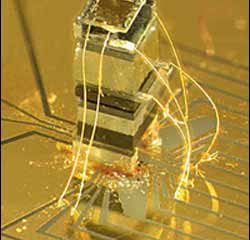The rice genome is larger, but we make the most of what we’ve got
In April 2003, scientists completed the massive Human Genome Project, recording for the first time in history the location and sequence of every gene in the human body. One result of the international project came as a bit of a shock. Scientists discovered that the body has only 30,000 genes, far fewer than the 50,000 to 140,000 they had expected to find.
Moreover, scientists learned that some less compl
SPACE DIGEST: JANUARY 2005
This release contains a summary of some significant astronomical and space events that will be taking place during January. It has been written in order to assist the media in planning and researching future stories related to space science and astronomy, particularly those with UK involvement. It is not intended to be fully comprehensive. Dates and times may be subject to change.
EINSTEIN YEAR
2005 is Einstein Year, the UK’s contribution to

A low-power, magnetic sensor about the size of a grain of rice that can detect magnetic field changes as small as 50 picoteslas–a million times weaker than the Earth’s magnetic field–has been demonstrated by researchers at the National Institute of Standards and Technology (NIST). Described in the Dec. 27 issue of Applied Physics Letters,* the device can be powered with batteries and is about 100 times smaller than current atom-based sensors with similar sensitivities, which typically wei
May help decipher regulator proteins’ roles in cell differentiation, cancer, and more
Finding out where gene-regulator proteins bind to DNA and identifying the genes they regulate just got a step easier thanks to a new technique developed by scientists at the U.S. Department of Energy’s Brookhaven National Laboratory. The technique could greatly speed the process of unraveling the role these proteins play in turning on and off the genes that establish the very identity of cells —
The biggest research project ever sponsored by the EU in the seafood sector will help to meet the consumer demand for more healthy products.
With the support of 14.4 million euros of EU funding under the ’food quality and safety’ priority of the current Framework Funding programme (FP6), SEAFOODplus aims to satisfy the growing consumer demands for healthy, safe products that are produced using sustainable, environmentally friendly methods and processed using state of the
Experiments led by Nicolas Dauphas of the University of Chicago and Chicago’s Field Museum have validated some controversial rocks from Greenland as the potential site for the earliest evidence of life on Earth.
“The samples that I have studied are extremely controversial,” said Dauphas, an Assistant Professor in Geophysical Sciences at the University of Chicago and a Field Museum Associate. Some scientists have claimed that these rocks from Greenland’s banded iron for